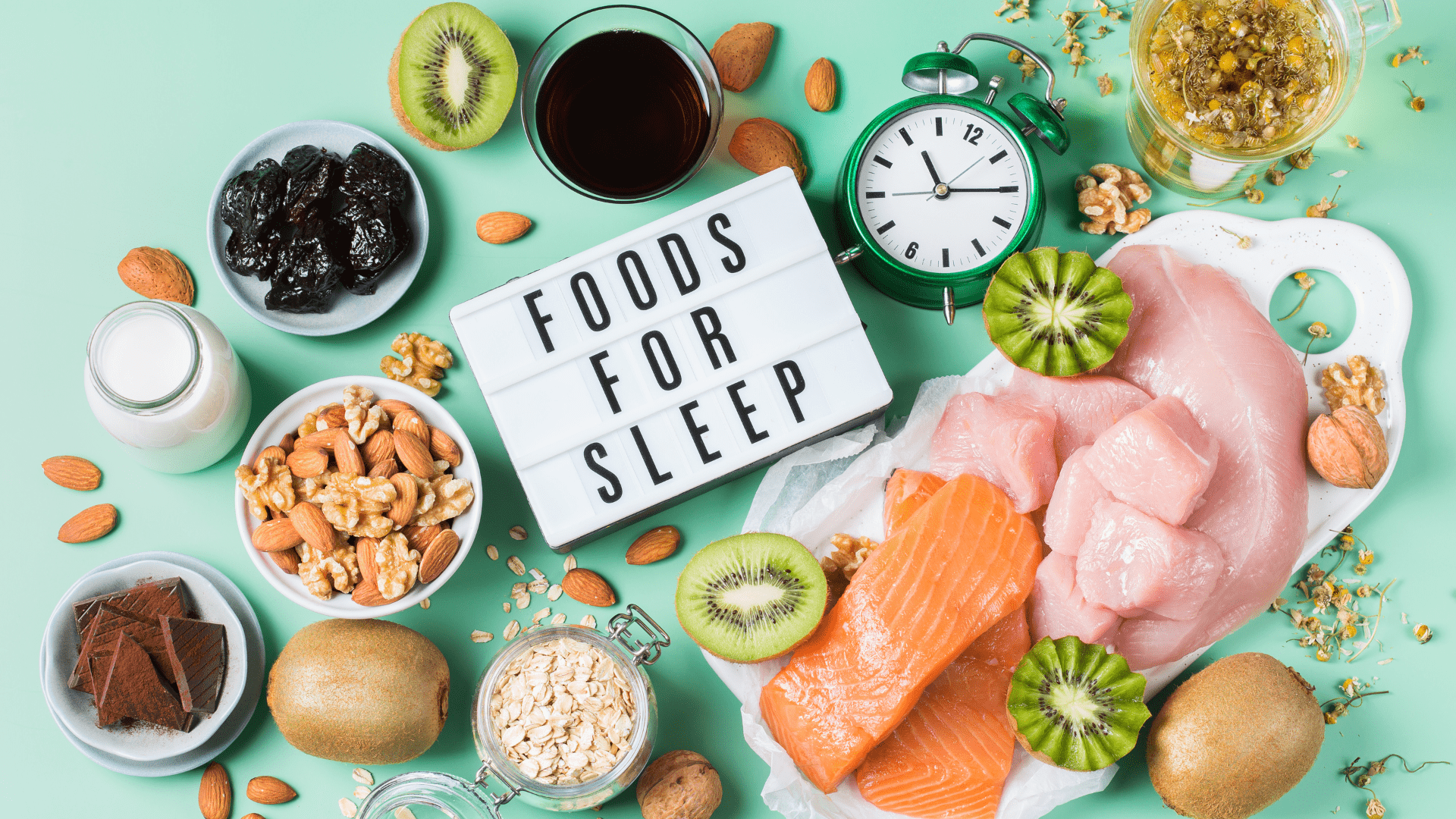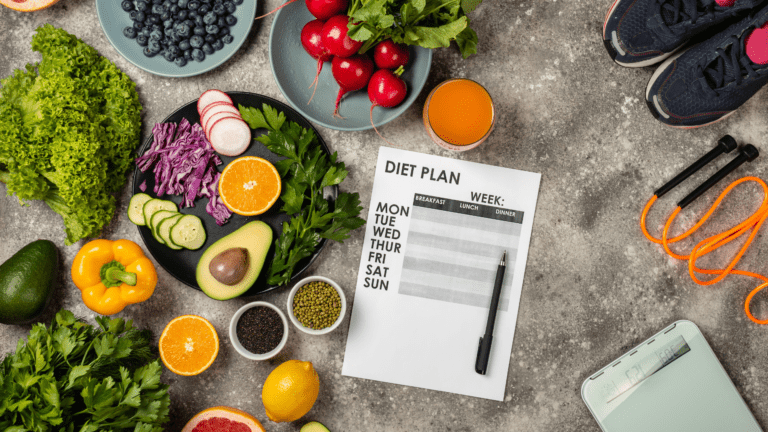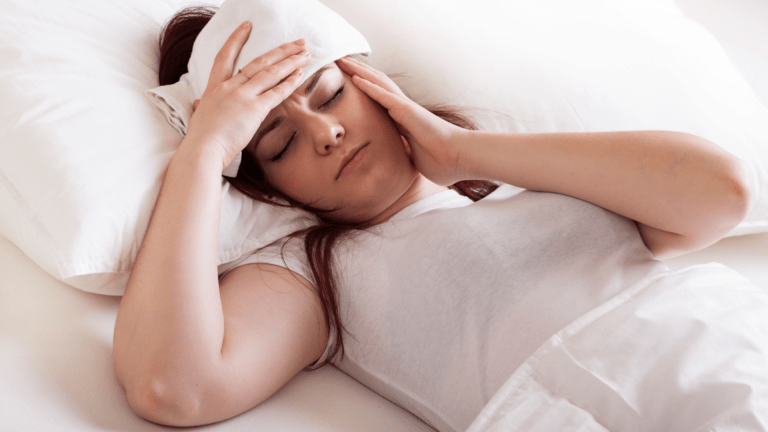You might have heard that eating before bed is bad for you. It’s a common belief that having a snack before you hit the hay will lead to weight gain or disrupt your sleep. But here’s the thing: not all foods are created equal when it comes to bedtime snacks. Certain foods can help you sleep better. Surprised? Let’s dive into how the right bedtime snacks can make a world of difference in your sleep quality.
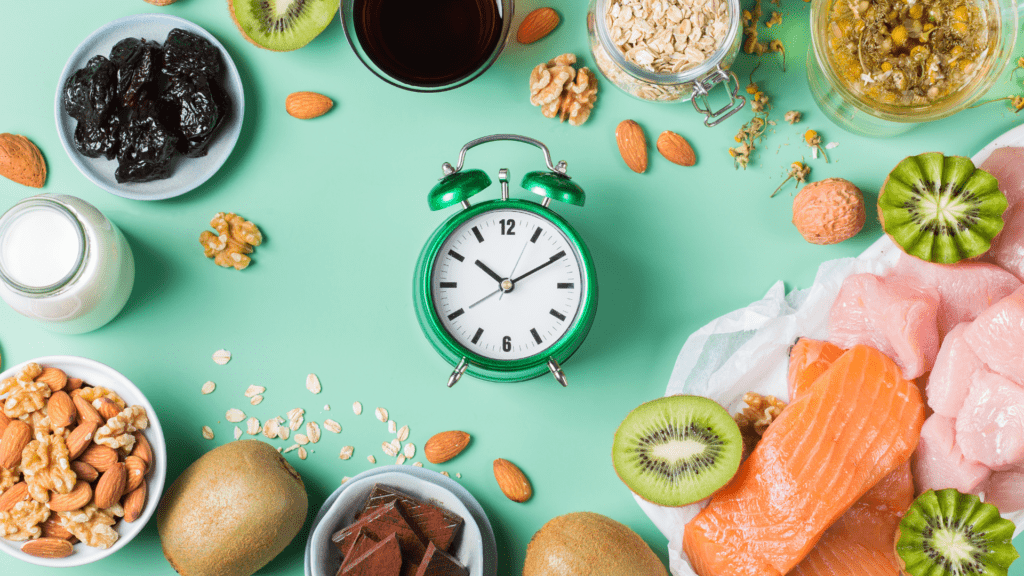
The Importance of a Good Night’s Sleep
We all know that a good night’s sleep is crucial. But it’s not just about how long you sleep; it’s also about how well you sleep. Quality sleep helps your body repair itself, improves memory, boosts your mood, and even keeps your immune system strong. When you consistently get poor sleep, it can lead to a host of problems like weight gain, stress, and even chronic illnesses. This is why focusing on foods that help you sleep is more important than you might think.
How Certain Foods Can Help You Sleep Better
So, how exactly can food impact your sleep? It turns out that certain nutrients and compounds found in foods can help you fall asleep faster and enjoy deeper, more restful sleep. Some foods are rich in tryptophan, an amino acid that your body converts into serotonin and melatonin, the hormones responsible for regulating your sleep-wake cycle. Others contain magnesium, which helps relax your muscles and nerves, making it easier for you to drift off.
When you reach for the right bedtime snacks, you’re essentially giving your body the tools it needs to wind down. Imagine eating before bedtime not as a guilty pleasure but as a smart choice to enhance your sleep. Foods that promote sleep like almonds, warm milk, and cherries can make a big difference in how well you rest at night. In addition to choosing the best snacks, improving your sleep hygiene is crucial for overall sleep quality.
Let’s take a closer look at how these foods work their magic and how you can incorporate them into your evening routine.
How Food and Sleep Are Connected
What you eat can significantly impact how well you sleep. Foods rich in certain nutrients, like melatonin and tryptophan, help regulate your sleep cycle and promote relaxation, making it easier to fall and stay asleep.
Understanding the Link Between Food and Sleep
Ever wondered why you feel sleepy after Thanksgiving dinner? It’s not just the turkey; it’s what’s in the turkey. That’s right—tryptophan. This amino acid is found in several foods, and it’s a key player in promoting sleep. When you consume foods that help you sleep, you’re providing your body with the building blocks it needs to produce serotonin and melatonin, the hormones that regulate sleep.
But tryptophan isn’t the only sleep-helper in the food world. Magnesium, found in foods like almonds and spinach, plays a critical role in relaxing your muscles and calming your nervous system. It’s one of those nutrients that can make you feel more at ease and ready to sleep. So, when you’re thinking about what to eat before bed, consider reaching for something high in magnesium.
Another important factor is melatonin, a hormone that regulates your sleep-wake cycle. While your body naturally produces melatonin, certain foods like cherries can boost its levels, making it easier for you to fall asleep. This is why bedtime snacks like cherry juice or even a handful of cherries can be a great addition to your evening routine.
The Role of Tryptophan, Magnesium, and Melatonin
Let’s break down how these three nutrients—tryptophan, magnesium, and melatonin—work together to help you sleep better.
Tryptophan
This amino acid is the starting point for better sleep. Once you consume tryptophan-rich foods like turkey, yogurt, or oats, your body converts it into serotonin. Serotonin, often called the “feel-good” hormone, not only boosts your mood but also plays a role in producing melatonin, which tells your body it’s time to sleep.
Magnesium
Magnesium is a mineral that’s essential for over 300 biochemical reactions in your body, including those that help you sleep. Foods rich in magnesium, such as almonds and bananas, can help relax your muscles and calm your nervous system, making it easier for you to drift off. So, if you’re looking for the best bedtime snacks, consider grabbing a handful of almonds before bed.
Melatonin
Melatonin is the hormone directly responsible for regulating your sleep-wake cycle. Your body naturally produces it, but you can also get it from foods like cherries, which are one of the few natural sources of melatonin. This makes cherries one of the best fruits to eat before bed if you’re aiming to improve your sleep.

By understanding how these nutrients work, you can make smarter choices about eating before going to bed. Instead of worrying about whether it’s okay to eat before bed, focus on what you’re eating. Choosing foods that make you sleepy can turn your evening snack into a sleep aid.
The Best Foods to Eat Before Bed
You’ve probably heard the myth that eating before bed leads to weight gain or disrupts your sleep. But this isn’t entirely true. The key is to focus on foods that promote sleep and avoid heavy, greasy, or sugary snacks. Eating the right foods at night can help you relax and prepare your body for rest. Let’s explore some of the best foods to eat before bed that can help you sleep better.
Top Foods to Help You Sleep
When it comes to choosing the best snacks before bed, you want to focus on light, nutrient-dense options that contain sleep-promoting ingredients. Here are a few examples of good snacks before bed that can help you catch more Z’s:
Almonds
Packed with magnesium and healthy fats, almonds before bed are a great option. They help relax your muscles and calm your mind, making them one of the best bedtime snacks to support better sleep.
Bananas
Rich in magnesium, potassium, and tryptophan, bananas are an ideal snack before bed. They help soothe your muscles and promote the production of serotonin, which gets converted into melatonin—your sleep hormone.
Oatmeal
While it’s commonly known as a breakfast food, a small bowl of oats makes for one of the best foods to have before bed. Oats contain complex carbs that help boost the release of serotonin, calming your mind and body.
Turkey
Turkey is one of the foods that make you sleepy thanks to its high levels of tryptophan. A slice or two before bed can work wonders for your sleep cycle.
Cherries
These are considered the best fruits to eat before bed because they are naturally high in melatonin. A small serving of cherries or a glass of tart cherry juice can help regulate your sleep cycle and make falling asleep easier.
These snacks aren’t just tasty—they’re functional. They support your body’s natural ability to fall asleep and help you feel more rested in the morning. These foods for sleep are simple, effective, and easy to incorporate into your nighttime routine.
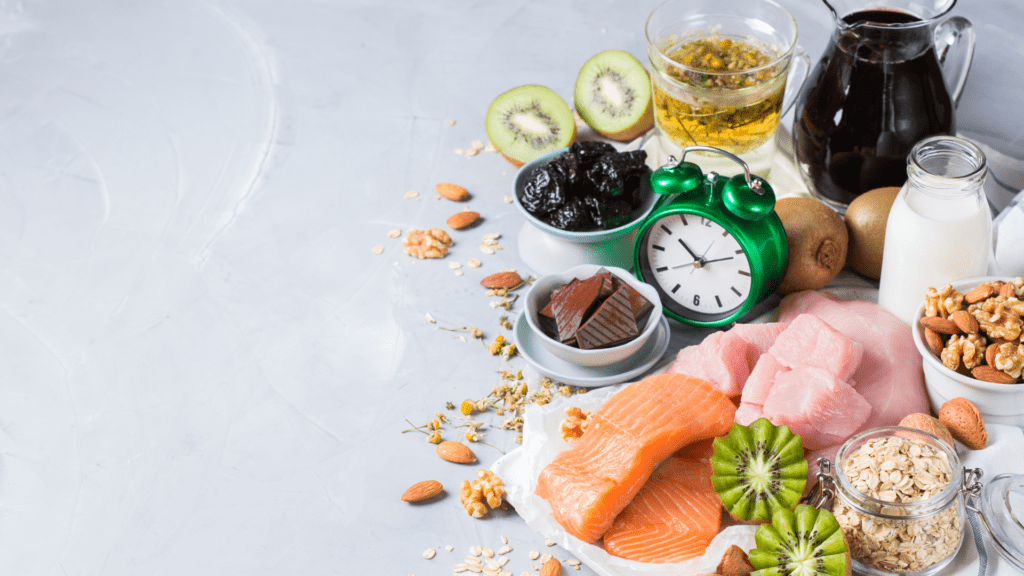
Foods to Avoid Before Bed
Now that you know what to eat before bed, let’s talk about what you should avoid. Not all bedtime snacks are good for your sleep, and eating the wrong thing can leave you tossing and turning all night. Here are a few types of foods you’ll want to steer clear of before hitting the pillow:
Sugary Snacks
Foods high in sugar can cause a spike in your blood sugar levels, leading to an energy crash that might disturb your sleep cycle. Stay away from candy, cookies, and other sugary treats.
Greasy Foods
Heavy foods, especially those high in fat, can cause indigestion and make it harder for you to fall asleep. Avoid things like burgers, fries, or anything too greasy right before bed.
Spicy Foods
Eating spicy foods before bedtime can trigger acid reflux or heartburn, making it difficult to get comfortable. It’s best to save the hot sauce for lunch instead.
By avoiding these foods and opting for the best thing to eat before bed, you’re setting yourself up for a more restful night.
Best Bedtime Snacks for Better Sleep
Sometimes, the perfect way to prepare for a good night’s sleep is to enjoy a light, nutritious snack. The trick is to choose bedtime snacks to help you sleep—ones that provide just enough to satisfy your hunger without overwhelming your digestive system. Here are some of the best snacks before bed that will help you drift off easily.
Ideal Bedtime Snacks
Choosing the right bedtime snacks can enhance your sleep quality. Opt for light, nutrient-rich options like almonds, cherries, and Greek yogurt to help your body relax and prepare for a restful night.
Greek Yogurt and Honey
Greek yogurt is high in protein and contains tryptophan, making it a perfect option for a snack before bedtime. Adding a drizzle of honey not only sweetens it but also helps regulate insulin levels, promoting a more restful sleep.
Peanut Butter on Whole Grain Toast
This combination is one of the best bedtime snacks because it contains both complex carbs and protein. The carbs help your brain absorb tryptophan from the peanut butter, enhancing your sleep.
A Handful of Walnuts
Walnuts are rich in melatonin, which makes them an excellent food for sleep. A small handful before bed can help regulate your sleep-wake cycle and improve sleep quality.
Cottage Cheese with Pineapple
Cottage cheese contains casein protein, which digests slowly and helps repair muscles while you sleep. Paired with pineapple, which contains serotonin-boosting properties, it becomes one of the good snacks to eat before bed.
These snacks are simple yet effective when it comes to promoting better sleep. Not only are they tasty, but they also contain the nutrients needed to help your body relax and unwind at the end of the day.
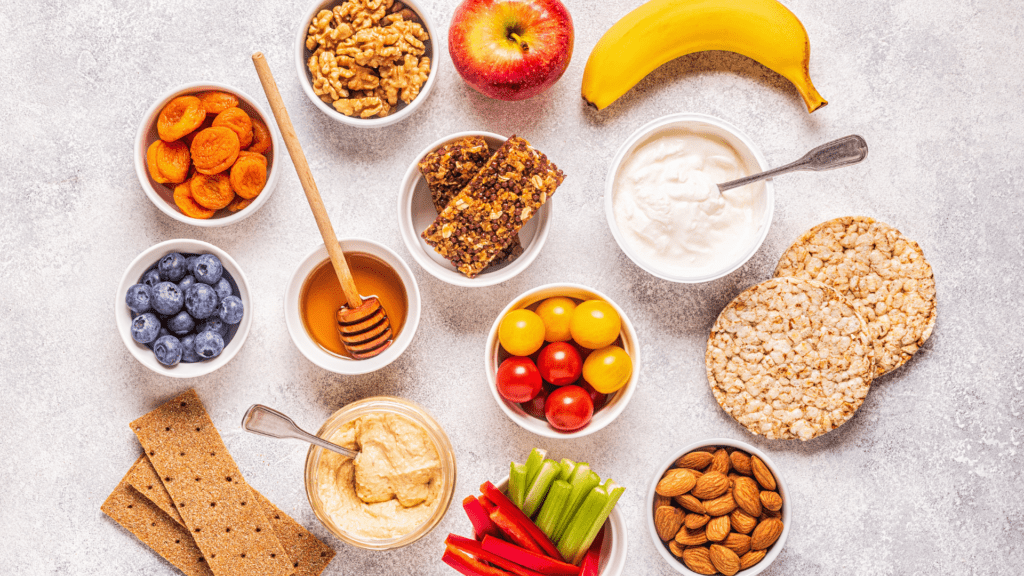
Balancing Portion Sizes and Timing
When it comes to eating before bedtime, portion size and timing matter. You want to aim for a light snack that won’t overwhelm your digestive system but will still keep you satisfied throughout the night.
A common mistake is eating too much or too little before bed. If you go to bed hungry, you might wake up in the middle of the night feeling ravenous. On the other hand, eating a heavy meal too close to bedtime can lead to discomfort and indigestion. That’s why it’s important to strike a balance with your good snacks before bed.
The key is to eat your bedtime snacks about 30 to 60 minutes before you plan to sleep. This gives your body enough time to digest the food and start processing the sleep-inducing nutrients. Stick to small portions—something around 150 to 200 calories is ideal. This way, you’re getting the nutrients you need without overloading your system.
By choosing the best snacks before bed and eating them at the right time, you can enhance your chances of a peaceful, uninterrupted sleep.
Best Foods to Eat at Night for Better Sleep
You may have heard the myth that eating before bed is bad for your health and will prevent you from sleeping well. However, that’s not always true. Choosing the right foods before bed can promote better sleep, while the wrong ones can disrupt it. The key is to focus on foods that help you sleep and avoid anything too heavy or difficult to digest.
Ideal Foods to Promote Sleep
Some foods for sleep contain natural compounds like tryptophan, melatonin, and magnesium, which can help calm the body and mind. Here are some of the best foods to eat at night to support a restful slumber:
Kiwi
Not many people know this, but kiwis are considered one of the best fruits to eat before bed. They’re rich in serotonin and antioxidants, which have been linked to improved sleep quality and duration.
Fish (Salmon, Tuna, Mackerel)
Fatty fish like salmon and mackerel are excellent foods to make you sleepy. They contain high levels of omega-3 fatty acids and vitamin D, both of which are known to help regulate serotonin production and promote sleep.
Rice
Believe it or not, rice can be one of the best foods to eat at night. It has a high glycemic index, meaning it helps improve the secretion of insulin and tryptophan, which can increase melatonin levels and help you fall asleep faster.
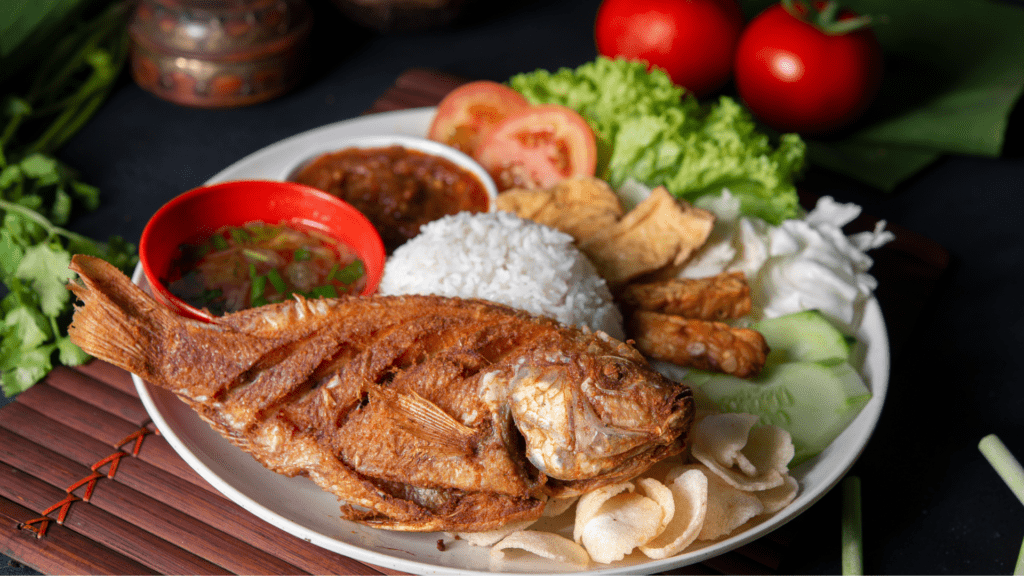
These foods are not only healthy but are also scientifically proven to help you sleep better. They contain the nutrients your body needs to relax and transition into rest mode.
Foods to Avoid at Night
On the flip side, there are certain foods you should avoid eating late at night if you want to get a good night’s sleep. These include foods that are difficult to digest, as well as those that might stimulate your nervous system.
Caffeine
This one’s obvious but worth mentioning. Foods and drinks containing caffeine—like coffee, chocolate, and certain teas—can keep you awake, making it harder to fall asleep. Consuming caffeine late in the evening is one of the worst things you can do if you’re aiming for a restful night.
Fried or Fatty Foods
Greasy and heavy foods can cause indigestion, which is not conducive to a restful night. They’re the exact opposite of the best foods to have before bed because they make your body work overtime to digest them.
Spicy Foods
Spicy meals can cause heartburn or discomfort, especially when eaten right before bed. It’s best to save these for lunchtime instead of dinner if you want to avoid a restless night.
By sticking to light and nutritious options and avoiding heavy, spicy, and caffeinated foods, you’re setting the stage for better sleep.
Balancing Your Evening Snack with Sleep Goals
A common misconception is that you should avoid eating anything before bed if you want to sleep well. But the reality is that the right bedtime snacks can help you sleep better—if eaten in the right amounts and at the right times.
How to Balance Your Nighttime Snack
When it comes to eating at night, balance is key. A light snack that combines protein and complex carbs can help keep hunger at bay without overwhelming your digestive system. It’s not just about what you eat, but how much and when you eat it.
Portion Control
Eating large meals before bed can be counterproductive. Instead, opt for smaller portions of the best bedtime snacks, such as a handful of almonds, a slice of whole-grain toast with peanut butter, or a small bowl of oatmeal. These foods are light but satisfying, making them good snacks to eat before bed without causing discomfort.
Timing Your Snack
You should aim to eat your bedtime snacks about 30 to 60 minutes before you sleep. This gives your body enough time to digest the food and allows the sleep-inducing compounds in your food to take effect. Avoid eating too close to bedtime, as this can disrupt your sleep cycle.
Balancing your snack with your sleep goals helps ensure that your body has the nutrients it needs to relax without overwhelming your system. This way, you’ll be able to fall asleep more easily and stay asleep throughout the night.
The Ideal Nighttime Snack Routine
To maximize the sleep benefits of your nighttime snack, try establishing a routine. Create a habit of having your snack at the same time every evening, and choose the same types of good bedtime snacks. This signals to your body that it’s time to wind down and get ready for sleep.
For example, a small bowl of Greek yogurt with a few almonds or a banana paired with a glass of warm milk could be the perfect routine. These are not only good snacks before bed but also easy to prepare. The consistency of your routine will help reinforce healthy sleep habits over time.
This routine, when combined with the best foods for sleep, can make a huge difference in your sleep quality. It’s all about finding what works best for you and sticking to it regularly.
Best Bedtime Snacks to Help You Sleep
There’s a common myth that eating before bed is always bad for your sleep. People often think that snacking late at night will keep them tossing and turning. But that’s not entirely true. Choosing the right bedtime snacks can support your sleep, rather than sabotage it.
Best Bedtime Snacks for a Good Night’s Sleep
When picking snacks to help you sleep, aim for options that are light and easy to digest. The best bedtime snacks are those that combine certain sleep-promoting nutrients, like tryptophan, magnesium, and melatonin.
Almonds
Almonds are a fantastic choice if you’re wondering what to eat before bed. They’re rich in magnesium, a mineral known to improve sleep quality. A small handful of almonds before bed can help you feel more relaxed and prepare your body for sleep. They are among the best snacks before bed for their soothing properties.
Cherries
Did you know that cherries are a natural source of melatonin, the hormone that regulates sleep? Eating a small bowl of cherries or drinking tart cherry juice can be one of the best foods to eat before bed. They help increase melatonin levels in your body, making it easier to drift off to sleep.
Greek Yogurt
Greek yogurt is another excellent choice for a bedtime snack. It’s high in protein and contains tryptophan, which can aid in the production of serotonin, helping you relax. For the best snack before bedtime, consider pairing Greek yogurt with a drizzle of honey or a few slices of banana.
These snacks are not only healthy but also specifically beneficial for promoting sleep. They provide the nutrients your body needs to wind down and prepare for a good night’s rest.
Snacks to Avoid Before Bed
Not all snacks are created equal when it comes to promoting sleep. There are certain foods you should steer clear of if you want to get a restful night’s sleep.
Sugary Foods
Foods high in sugar, like candy or sugary cereals, can cause a spike in your blood sugar levels. This can make it harder for you to fall asleep. Instead of reaching for these, opt for snacks that have a balanced mix of protein and carbs.
Caffeinated Beverages
This one is a no-brainer. Drinks like coffee, tea, or energy drinks contain caffeine, which is known to interfere with sleep. Even dark chocolate, which has a high caffeine content, can disrupt your sleep if consumed too close to bedtime.
Heavy or Spicy Foods
Foods that are high in fat or spicy can lead to discomfort and indigestion, which can make falling asleep difficult. It’s best to avoid rich, greasy meals and spicy snacks in the hours leading up to bedtime.
By avoiding these problematic snacks and focusing on the best foods to have before bed, you’ll improve your chances of enjoying a restful night. Choosing the right snacks can make all the difference in how well you sleep.
Tips for Choosing the Right Bedtime Snack
To get the most out of your nighttime snack, keep these tips in mind:
Keep It Light
Stick to small portions. Eating too much before bed can lead to discomfort and disrupt your sleep.
Combine Nutrients
Opt for snacks that combine protein and carbohydrates. This balance can help stabilize your blood sugar levels and support better sleep.
Timing Matters
Try to eat your snack about 30 to 60 minutes before bed. This gives your body time to digest and allows the sleep-promoting nutrients to take effect.
By following these guidelines, you can choose good bedtime snacks that will support your sleep goals and help you wake up feeling refreshed.
Incorporating the right snacks into your nighttime routine doesn’t have to be complicated. With a bit of planning and the right choices, you can enjoy better sleep and wake up feeling rejuvenated.
